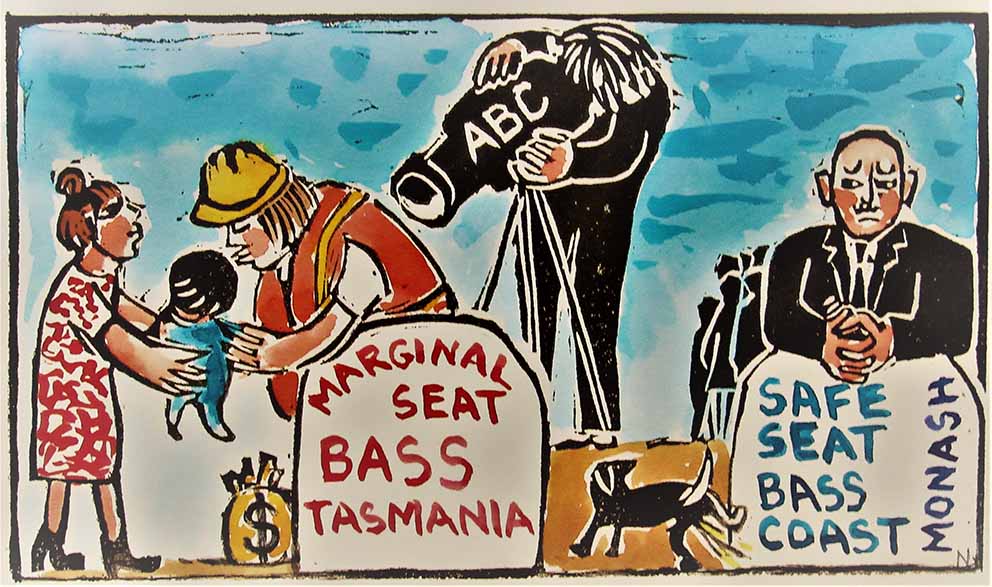WE KNOW the game. Politicians promise to govern for all Australians, but the reality is they care a lot more about you if you are lucky enough to live in one of the marginal seats which are their path to power.
They know it - and it has now become so obvious I reckon we all know it.
Now this is not a whinge about one particular party versus the other. It plays out across Australia in every election and is prosecuted by parties of every colour.
They’re all up to it.
Of course, this is fantastic if you live in a marginal seat where the road to your latest new sports stadium is paved in taxpayer-funded gold.
Here’s a fun fact. The northern Tasmanian seat of Bass, held with a slender 0.4 per cent margin by Liberal MP Bridget Archer, has 78,000 constituents and each of them has already been promised the equivalent of almost $6000 in spending commitments in the opening stages of this election campaign.
And there’s still another three weeks to go before election day on May 21.
Let’s compare that to Bass Coast within the federal seat of Monash, which is considered a safe seat for the Liberals.
I’ll declare my complete bias here as chief executive of the Bass Coast Shire Council, one of Victoria’s fastest growing regions.
Monash, an electorate with 112,000 voters, hasn’t had a single cent committed in this campaign. No new swimming pools, no new community centres, no recreation ovals, and you won’t find a single new federally funded carpark in Wonthaggi, Inverloch or Cowes.
What’s in a name? When it comes the federal seat of Bass versus Bass Coast it seems it means quite a lot when it comes to pre-election commitments.
Do we just roll our cynical eyes and shrug our collective shoulders hoping that one day some federal funding scraps might fall out of the pork barrel as it rolls on to the next marginal seat some backroom political party guru with a built-in pork barrel algorithm has targeted as a gettable seat?
You know the drill. Leaders in their shiny new high-vis vests and hard hats roll up and make their promises and commitments for the TV cameras, complete with some carefully selected nodders in the back of the shots.
Or do we say enough is enough?
It seems that to improve your community, it doesn’t matter whether you vote left or right but whether you vote marginal.
I have been through enough election cycles to know the system is broken. There is a prevailing win-at-all-costs culture and sadly we have all become so desensitised to blatant pork barrelling that the question of whether there is a better way to spend billions of dollars is rarely asked.
There is a better way, but it requires a significant shift in behaviour and of course courageous leadership. It demands our leaders put the interests of community ahead of themselves. Pre-election campaigns have to end cash splashes for votes and dedicate their time and media attention to the contest of ideas; where policy is fiercely debated and performance of incumbents scrutinised.
We need a federal government focussed on issues of national interest and importance; climate change, reconciliation, foreign affairs, immigration, health and education. Having a Federal Government concerned about which community receives funding to build a swimming pool or upgrade a football club is ridiculous. It is not their domain.
Community infrastructure and federal funding for local services is absolutely essential but why not address the inequities of the current council rating system to deal with this shortfall?
Alternatively, the Federal Government could provide significant and equitable funding through the existing Financial Assistance Grants Program to local governments so they can direct resources appropriately on behalf of their communities.
Local government is often referred to as the government closest to the communities it is there to serve. Legislation requires that councils engage with communities to develop key council plans and strategies. This means that when councils spend money on big ticket items like pools and community centres, they have been through significant community engagement and feasibility. Therefore, they are wanted and as a result far more likely to be used and to deliver the community benefit intended.
Most metropolitan and certainly regional councils can’t afford this infrastructure on their own. As a consequence, they are currently forced to play in a broken system bartering to secure pre-election commitments. Councils also spend significant time and money to make applications into Federal Government grant programs whose transparency and fairness has too often already been compromised because ministerial interference is also part of this game.
If all electorates were as close as Tasmania’s Bass or as safe as Victoria’s Bass Coast, there would be no pork barrelling. We must address the inherent problems in plain sight. If we don’t, the only change we will see at the next election … will be marginal
Ali Wastie is chief executive officer of Bass Coast Shire Council.
